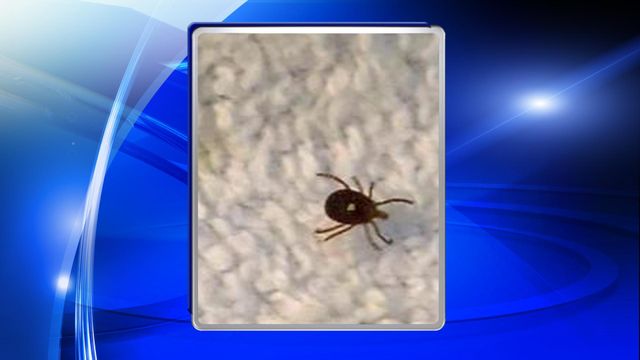Tick bite leads to food allergy for Durham woman
Clare Smith didn't feel well. Shortly after getting into bed, she began getting a stomach ache, headache, chills and rash. Four hours earlier, she was feeling fine and enjoying a Memorial Day cookout at her boyfriend's home in Chatham County, where she ate a cheeseburger.
Posted — UpdatedShe decided to call her doctor’s office to ask about her strange sickness, and that’s when she got her answer.
“I talk to this nurse and she goes, ‘You have this tick allergy that makes you allergic to meat,’” Smith, 57, of Durham, recalled. “And she goes, ‘I have it, and three members of my family have it.’”
Alpha-Gal is the name of a sugar carbohydrate found in the fat of the meat of mammals, such as beef, pork or lamb. When bitten by an infected tick, people like Smith produce an antibody to Alpha-Gal, which causes the allergic reaction. The carrier is the Lone Star Tick.
Drag a towel through tall grass near a wooded area and Lone Star ticks are likely to appear. The female has a lone white spot on its back, while the male has white lines across the rear edges of his back.
North Carolina State University Veterinarian Dr. Ed Breitschwerdt's research lab specializes in tick-borne organisms. He says ticks often get to humans by way of their pets.
“Healthy pets make for healthy people,” he said.
But not all healthy people react the same way to a tick-borne infection.
“It certainly may be the exception rather than the rule that someone who had an allergic reaction with a Lone Star Tick would go on to develop a meat allergy,” Breitschwerdt said.
Those who do could develop more severe reactions to meat, such as anaphylactic shock causing swelling that makes breathing difficult. The key is preventing contact with ticks altogether, including using tick and insect repellents made for pets and products for humans.
“They should be used routinely when anybody's going into an environment where they'll have tick exposure,” Breitschwerdt said.
As for Smith, she now has to avoid any form of mammalian meat – a big lifestyle change she didn't see coming. She says she knows she was fortunate to have identified the allergy so early. Now, she'll just stick to poultry and fish.
For those who develop a meat allergy as a result of a tick bite, the only treatment is to avoid mammalian meat, according to WRAL Health Team Physician Dr. Allen Mask.
“There are some initial signs that the Alpha-Gal antibody level goes down over time, especially if you are able to avoid additional bites from ticks or chiggers,” Mask said. “You could get re-tested after several months to see if the level of the Alpha-Gal antibody in your blood has decreased. It's important to consult an allergist.”
Mask says it’s important to know that there are other tick-borne diseases, many of which have very similar early symptoms. The bite is often painless, and the tick may drop off before the person sees it, but there will typically be a rash at the area of the bite.
“That's when you should see a doctor about it,” Mask said.
Among the most common diseases are:
- STARI (Southern Tick-Associated Rash Illness), also carried by the Lone Star Tick
- Rocky Mountain Spotted Fever, potentially fatal if not diagnosed and treated early, carried by the Dog Tick
- Lyme Disease, known to be carried by the Deer Tick
People infected with Lyme Disease may develop neurological symptoms that mimic muscular sclerosis. Lyme Disease was once considered to be isolated to the northeast of the country and moved down as far as Virginia. Now, veterinarians across the state have reported seeing it appear in northern counties of North Carolina.
• Credits
Copyright 2024 by Capitol Broadcasting Company. All rights reserved. This material may not be published, broadcast, rewritten or redistributed.





